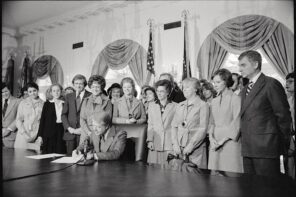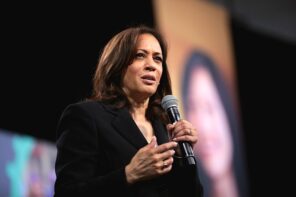Did President Obama achieve his political goals in his first State of the Union address to Congress? That debate continues apace. But according to RD contributor Daniel Schultz in this excerpt adapted from his forthcoming book, Changing the Script (Ig Publishing, 2010), the president failed to articulate anything truly new or truly hopeful —Ed.
To have hope, the people must be able to trust that there can be meaningful change. This is precisely why the 2008 Obama campaign ran against the policies of the Bush Administration under the rubric of “hope.” Modest, incremental change motivates no one.
Old Testament scholar and theologian Walter Brueggemann says that when “serious hopefulness” is locked out of the public conversation, the consciousness created to serve the interests of the powerful cannot be pierced, and the idea of real change cannot be entertained.
What is most needed is what is most unacceptable—an articulation that redefines the situation and that makes way for new gifts about to be given. Without a public arena for the articulation of gifts that fall outside our conventional rationality, we are fated to despair. We know full well the makings of genuine newness are not included among these present pieces. And short of genuine newness life becomes a dissatisfied coping, a grudging trust, and a managing that dares never ask too much. (The Prophetic Imagination, p. 63)
This is what Obama seems to have been shooting for—and failed to achieve. Where his rhetoric soared on the campaign trail, in the State of the Union it seemed pinched and small-bore. Perhaps the president, himself a talented writer, should have exerted more control over the drafting of the speech. The basic problem, however, was not rhetorical but conceptual. By hedging his bets and working within a conservative framework, Obama missed an opportunity to summon the nation to what theologian John F. Haught has called God’s “gracious, extravagant, and surprising future.”
The president seems to have misunderstood the intertwined tasks in articulating a vision of “serious hopefulness.” The prophetic task is to accept what has come to an end, and to anticipate alternatives as they emerge. As a strictly religious matter, this is helping the people understand that God has more blessings in store for them, despite all the evidence to the contrary.
The progressive task in articulating hope is to assert, against the forces that limit, harass, and dismiss reform, that it is not only possible, but necessary. Without constant agitation for justice and equality, our economy will never move from the stasis that creates financial catastrophe. This is more than keeping politicians’ feet to the fire. It is bringing into the political conversation a sense of new possibilities and alternatives, no easy task in a public realm that makes a fetish of realism and greets visions with cynicism and indifference.
Obama did some of this, as when he argued for the creation of green jobs, or talked about the need for financial reform. But as some commentators have noticed, he failed to use some key words to recognize the need for economic justice: “foreclosure,” “poor,” “low-income,” “hungry.” And as Paul Krugman notes, Obama’s insistence that the government “tighten its belt” not only rehearses the very same rhetoric used by Republican leaders, it rejects the basic premise of Keynsian economics: that governments should spend more, not less, in a critical economic period.
Furthermore, for prophets and progressives alike, the work is to establish a sense of hope that eludes the control of powerful forces. To be kept in the unchanging order of the “royal consciousness” only breeds despair. The people need to hear that the powers that be are not in final control of their destiny. Again, this is no easy task. Real hope is a frightening, disorienting business, as are new beginnings. There is no guarantee that a reordered economic system can be achieved. In fact, there’s every reason to expect that the current system would reestablish itself.
In order to articulate a vision of hope that will energize people to overcome their fear, prophetic speech must penetrate the numbness and despair that keep them frozen in place.
Prophets know what others do not: that God has a prior claim on the people. It is that claim—and God’s zeal in protecting and upholding it—that constitutes reality, not the smoothly textured lies of power. While that is not the kind of pronouncement typically made in a State of the Union address, there was a missed opportunity even in secular terms. The president could have reminded his audience that their fellow citizens are more than the sum of their economic parts. He did so only in the most muted of tones at the end of the speech, touching on Americans’ “spirit of determination and optimism” in the face of adversity.
Prophetic speech must also recognize the power of language to “shape consciousness and define reality.” If the royal consciousness is be unseated, its control over our vocabulary must be contested, its largely unseen effects exposed. This is hardly a radical insight for those who have studied political struggle, especially in the communications age. Bloggers have done a particularly good job of processing the official rhetoric of politicians and the media to expose how it supports oppression and exploitation.
There is no field more ripe for redefinition than our current economic language, nor any more powerful language for redefining it than scripture. The ever-brilliant blogger, ‘billmon,’ proved this point by mocking a particular euphemism for official corruption through a simple substitution of Bible passages. Thus Deuteronomy 16:19 became:
You must not distort justice; you must not show partiality; and you must not accept transactional lobbying, for transactional lobbying blinds the eyes of the wise and subverts the cause of those who are in the right.
I would have loved to see the president punch through some of the Beltway jargon used to obscure the application of raw power. It would have been a powerful way to call out the pretensions of the Congress he addressed and identify himself as being on the side of working people. Apparently, he thought this was not the time or place to do that.
But prophetic speech goes beyond redefining language to “bring to public expression” the “hopes and yearnings” of the people that have been pushed back out of conscious awareness. To engage the prophetic imagination not only points the way forward, it awakens the very desire to press on.
To express hope in this context is countercultural. It speaks against conventional wisdom and for the prior claim that God establishes on his people. The hope surpassing all hope is that God is somehow for us in this economic morass. To say as much is a frontal challenge to the present order which declares that all is as it should be, that God belongs in the private sphere, safely away from the social and economic order we are assured God will not upset. Hope believes that there is a better way—or more precisely, that we can be led to a better way and receive the fulfillment of better promises than those made by a consumerist capitalist system. This hope is rooted in the covenantal relationship between God and people which resists the reduction of personhood to productivity or purchasing power.
However, a prophetic response to the economy roots itself not in exhortations to greater charity, nor in strident denunciations of those held to blame for the crisis, but in the anticipation of what the free God intends to do for us. Whenever people yearn for a better way of life, they express their knowledge that they and their world are incomplete. There is much work to be done before we can be said to live in a truly humane system. The progressive claim is that there can be a fairer system. The religious progressive claim is that God is at work to create that new way of life, and to lead us into it.
Conservative perspectives on faith have been desperate to suppress this insight for decades. God is free, and in that freedom, for the poor. That there is the possibility of change, that the bubble has burst and the financial certainties are on the brink of collapse, that the numbness and despair have been pierced—all of this should be evidence for the faithful that God is “operating under a new plan.”
This is not the hope Joe Hill famously derided as “pie in the sky, by and by,” but a hope founded on realism in the current situation, and an equal realism in God’s freedom. The reality of our current economy is that the oppressive, exploitative financial system appears to have made a recovery, but in truth only hangs on by its fingertips. In the long run, it is not sustainable, nor can it be maintained even in the near term without the acquiescence of the very people it crushes. The consumers upon which the predatory system depends have begun to get the idea that the system does not work for them, and that it can be changed. To say as much is to enact the hope of new possibilities. As soon as the reality is articulated, the people can begin to grasp the newness all around them.
Here, Obama was both at his strongest and his weakest. He was strong when he pushed for passage of a health care reform bill in the name of struggling Americans. He was disastrously weak when he crawled back into the conservative frame of “paying as you go” by means of a spending freeze on non-discretionary, non-military budget items. That idea has as many holes as old Swiss cheese, and promises about as much newness. Real hope and real possibility come not from a more virtuous shuffling of the deck chairs, which leads us into the pious error of believing in our capacity to solve any problem, but from God’s initiative to remake the system. Brueggemann says that
Talk about newness in exile comes not from a happy piety or from a hatred of Babylon but from the enduring jealousy of Yahweh for his people. (The Prophetic Imagination, p. 67)
Proposals to make our economic system fairer or “more Christian” ultimately miss the point. To call for more fairness or more generosity or more concern for the poor without fundamentally altering the way the system works is mistaken. Perhaps the most radical thing that a religious left can proclaim is that God is for us, and will not tolerate dehumanization, the “‘objective,’ systemic, anonymous” violence of capitalism, in Slavoj Zizek’s words. We are “fearfully and wonderfully” made in the image of God. Our elemental connection to God, maintained by his faithfulness—by his jealous love for his people—means that by grace we are not destined to be brickmakers for Pharaoh, nor debt slaves in a post-industrial America. It is that knowledge that fully redefines our situation and gives us hope for newness in it. Say what you will about the political effectiveness of last week’s speech, but Obama didn’t lay a finger on that prophetic truth.




